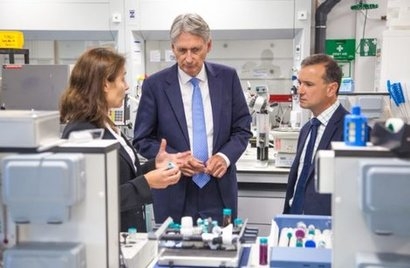
The new Active Building Centre will seek to remove barriers and accelerate market adoption of new solar-powered building design. Funded by the UK government through the Industrial Strategy Challenge Fund and UKRI and based in Swansea University, it will be a national centre of excellence working with supply chains from energy and construction supported by ten universities: Swansea, Bath, Newcastle, Birmingham, Loughborough, UCL, Sheffield, Cardiff, Imperial College London and Nottingham.
UK buildings now account for around 40 percent of our energy consumption and associated carbon emissions, yet the way we create and operate buildings has not changed. They are still consumers of energy, not active and energy positive. Active buildings can save money on energy bills and contribute to a more sustainable world.
The Active Building Centre’s vision is to transform the UK construction and energy sectors, through the deployment of Active buildings powered by the sun, creating energy resilient communities, and significantly contributing to electric vehicle and decarbonisation targets.
The industry and university partners, which represent the best in their fields, bring together a wide range of expertise including engineering, energy systems integration, social science, and systems optimisation. Together, they will work in core areas to create:
A critical mass of Active Building demonstrations to showcase technologies and demonstrate scalability.
Technologies and toolkits – for building designers and engineers to support the uptake of new building design.
New business models – working with companies to develop models that will accelerate market scale-up and adoption.
An evidence base for Active Buildings – including research to understand how occupants use and interact with Active Buildings as well as technical performance data. The Active Building Centre will also help develop supply chain capacity and identify skills gaps, which could affect industry acceptance of Active Buildings and inform policy.
The new Active Office and Active Classroom
The Active Building Centre’s building programme will include its own flagship building, the ‘living lab’, which will be located next to Swansea University’s Bay Campus. A portfolio of 300 further buildings will be developed UK-wide in close collaboration with developers and supply chains, to address different market sector needs.
“Swansea University and the innovative companies working with it are world-leaders in clean energy” said Mr Hammond. “The UK Government is backing the industries of the future that will deliver jobs and opportunities across Wales. This £36 million new funding will support exciting green technology that could cut energy bills, reduce carbon emissions and create better homes and workspaces.”
Professor Richard Davies, Vice Chancellor of Swansea University, added that it’s wonderful that the work of SPECIFIC Innovation and Knowledge Centre and expertise at Swansea University has been recognised by the UK Government, in choosing Swansea as the location for the national Active Building Centre. It will be located next to the university’s Bay Campus, where recently the university opened the Active Office, the UK’s first energy positive office, and where the Active Classroom has now been working successfully for 18 months, generating more than one and a half times the energy it has consumed. The Active Building Centre acknowledges those efforts and takes them to the next level, on a UK platform to deliver national impact.
Professor Dave Worsley, Vice President for Innovation and principal investigator for the centre, explained that the Active Building Centre aims to break down the barriers that prevent mass uptake of solar-powered buildings. The new centre will bring together the university’s experience with the Active Classroom and Active Office with social, business, policy and energy expertise from universities and companies across the UK.
Image: Dr Jenny Baker from Swansea University's College of Engineering, pictured with Chancellor of the Exchequer Philip Hammond and Secretary of State for Wales, Alun Cairns
For additional information:

